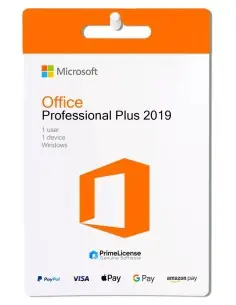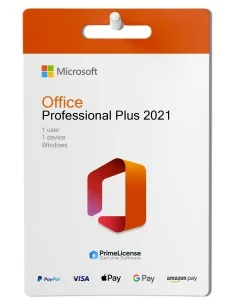
In the following article, we explain the nature and the various differences of software licences that are currently available on the market, briefly comparing them with each other. We explain why it is possible to resell licences on the market after initial acquisition, what is meant by an 'ESD' licence, and what are the risks of using and purchasing pirated or unofficial software-house licences.
LICENSE DETAILS
- Retail licenses, whether for Windows, Office, or other software, are often available in both physical (boxed) and electronic (ESD) formats. Retail ESD licenses are purchased online and provide a digital download link or product key for immediate installation. Users can download the software from the internet and activate it using the provided key.
- OEM licenses, particularly for Windows, may also be distributed through electronic software distribution. When you purchase a new computer, the Windows operating system is often pre-installed on the device using an OEM ESD version. This means that Windows is electronically distributed and installed on the computer at the manufacturing stage.
- Volume Licenses: Volume licensing agreements, which are typically used by businesses and organizations, often involve ESD for software deployment. Organizations receive digital copies of software, such as Windows, Office, or server software, through electronic distribution channels as part of their volume licensing agreement. ESD allows for efficient and centralized software deployment across multiple devices.
WHAT ARE ESD LICENSES?
ESD stands for "Electronic Software Distribution." It's a term commonly used in the context of software distribution and licensing, and it can be relevant to discussions about different types of software licenses, including retail, OEM, and volume licenses.
ESD refers to the digital distribution of software, where the software is delivered electronically over the internet or through other digital means, rather than being distributed physically on physical media like CDs or DVDs.
WHAT ARE "BIND" AND "NON-BIND" LICENSES?
Bind to (Tied to Microsoft Account, transferable):
Some Microsoft product keys, especially those associated with retail or digital downloads, can be associated with a Microsoft account during activation. This allows users to re-install and transfer the software to a different computer by deactivating it on the old computer and reactivating it on the new one.
Non-Bind (Tied to Hardware, non transferable):
OEM licenses for Windows and certain other Microsoft products are often "non-bind" to a Microsoft account. They are tied to the specific hardware on which they were originally installed by the OEM. These licenses are typically non-transferable to other computers.
The key distinction here is whether the product key can be associated with a Microsoft account, which often indicates transferability, or if it's tightly bound to the original hardware.

WHERE DO WE STAND?
PrimeLicense is an online store specializing selling of genuine software license keys for popular digitally downloaded software (ESD), such as Microsoft Office or Windows.
PrimeLicense offers competitive prices for these software licenses, leveraging the 2012 ruling by the Court of Justice of the European Union (CJEU) that allows for such resales, more details here.
PrimeLicense distinguishes itself by offering valuable benefits to customers:
- Free Technical Support: PrimeLicense provides free technical support throughout the entire process, from downloading the software to installation and activation. This support ensures a smooth and hassle-free experience. You can access their support via the contact page here.
- TrustedShops Warranty: PrimeLicense offers a TrustedShops warranty, assuring customers of the legitimacy and authenticity of the licenses they sell. This warranty provides peace of mind for buyers, knowing they are acquiring genuine and lawful software, for more details click here.
- Safe Payments and Immediate Delivery: PrimeLicense ensures secure payment methods, protecting your financial information during the purchase process. Plus, when you make a purchase, you can expect immediate delivery of your software license keys, allowing you to start using your software without delay, click here to know more.
PIRATED LICENSES
Pirate software, in simple terms, refers to unauthorized or illegal copies of software. It's when someone uses, copies, or distributes software without the proper permission or a valid license from the software's developer or owner. In other words, pirate software is software that you didn't pay for or obtain through legal means, like purchasing it from the official vendor or using a legitimate free version.
What is the risk involved in downloading and installing pirate software?
Using pirated or unauthorized software on a computer can pose various risks and consequences from the customer's side. It's essential to understand these risks before considering or using such software:
- Legal Consequences: Perhaps the most significant risk is the potential for legal consequences. Using pirated software is illegal and can result in civil and criminal penalties, including fines and even imprisonment, depending on the jurisdiction and the severity of the violation.
- Security Vulnerabilities: Pirated software often lacks the security updates and patches provided by legitimate vendors. This can leave your computer vulnerable to malware, viruses, and other security threats that can compromise your data and privacy.
- Data Loss: Unlicensed software may be unstable or unreliable, increasing the risk of system crashes and data loss. This can lead to business disruptions, financial losses, and data recovery expenses.
- 4.Lack of Support: Unauthorized software typically does not come with official customer support. If you encounter issues or need assistance, you won't be able to rely on the software vendor for help, which can be particularly problematic for businesses.
- Compromised Functionality: Some pirated software may have features disabled, limited functionality, or be bundled with malicious code. This can hinder your ability to use the software effectively.
- Reputation Damage: Using pirated software can harm your reputation, especially in business environments. Customers, partners, and investors may view such actions as unethical and untrustworthy.
- Costly Audits and Legal Actions: For businesses, using pirated software can result in costly audits by software vendors or industry organizations. If violations are discovered, companies may face hefty fines and legal action.
- Incompatibility Issues: Pirated software may not work seamlessly with other legitimate software applications, leading to compatibility problems and decreased productivity.
- Limited Access to Updates: You won't have access to legitimate updates, bug fixes, and new features provided by the software vendor. This can hinder your ability to keep up with industry standards and technological advancements.
- Difficulty in License Compliance: Managing software licenses is often complex. Using unauthorized software can make it challenging to keep track of licenses and stay compliant with software usage agreements.
- Loss of Warranty: If your computer hardware experiences issues and it's discovered that pirated software contributed to the problem, you may void warranties on your hardware.

CONCLUSION
In summary, using pirated software can have severe consequences, including legal, security, financial, and reputational risks. It is strongly recommended to use only licensed and legitimate software to avoid these risks and ensure a safe and compliant computing environment.
Looking for unexpired licenses for your computer? You can find more details here.
Need more information or details? Contact us here!
 Ransomware: How to prevent and defend against it?27/03/2024Posted in: SecurityContinue reading
Ransomware: How to prevent and defend against it?27/03/2024Posted in: SecurityContinue reading What is Microsoft Word? Definition, evolution, versions and more15/03/2024Posted in: MicrosoftContinue reading
What is Microsoft Word? Definition, evolution, versions and more15/03/2024Posted in: MicrosoftContinue reading NORDVPN in comparison: Why is it the most used VPN?23/02/2024Posted in: SecurityContinue reading
NORDVPN in comparison: Why is it the most used VPN?23/02/2024Posted in: SecurityContinue reading Windows 12: The debut of a new generation09/02/2024Posted in: MicrosoftContinue reading
Windows 12: The debut of a new generation09/02/2024Posted in: MicrosoftContinue reading Copilot integration in Microsoft 365 and new functionalities25/01/2024Posted in: MicrosoftContinue reading
Copilot integration in Microsoft 365 and new functionalities25/01/2024Posted in: MicrosoftContinue reading Windows 12: The debut of a new generation09/02/2024Posted in: MicrosoftIn the following article, we discuss Microsoft's possible and yet-to-be-announced debut of Windows 12, which promises...Continue reading
Windows 12: The debut of a new generation09/02/2024Posted in: MicrosoftIn the following article, we discuss Microsoft's possible and yet-to-be-announced debut of Windows 12, which promises...Continue reading Office suites compared: Is a paid or free solution better?15/09/2023Posted in: MicrosoftThe following article shows in detail the main differences between paid plans and free licenses for publishing,...Continue reading
Office suites compared: Is a paid or free solution better?15/09/2023Posted in: MicrosoftThe following article shows in detail the main differences between paid plans and free licenses for publishing,...Continue reading Windows: How to meet the needs of your PC?03/10/2023Posted in: MicrosoftIn the following article we explain the main differences between the latest and most widely used editions of the...Continue reading
Windows: How to meet the needs of your PC?03/10/2023Posted in: MicrosoftIn the following article we explain the main differences between the latest and most widely used editions of the...Continue reading Navigating software licenses: Retail, OEM , Volume licenses and the dangers of pirating25/09/2023Posted in: MicrosoftWhat are the differences in the world of digital "Retail" licenses between the various types of activation? Let's...Continue reading
Navigating software licenses: Retail, OEM , Volume licenses and the dangers of pirating25/09/2023Posted in: MicrosoftWhat are the differences in the world of digital "Retail" licenses between the various types of activation? Let's...Continue reading Microsoft Copilot in Windows 11 23H2: What is there to know?30/11/2023Posted in: MicrosoftIn the following article we narrate and explore together Copilot, announced by Microsoft for Windows 11 version 23H2...Continue reading
Microsoft Copilot in Windows 11 23H2: What is there to know?30/11/2023Posted in: MicrosoftIn the following article we narrate and explore together Copilot, announced by Microsoft for Windows 11 version 23H2...Continue reading








